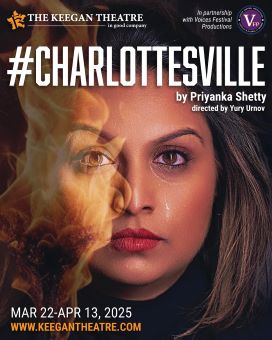HAUNTING, URGENT, AND SPEAKS VOLUMES
Priyanka Shetty’s #Charlottesville, currently running at the Keegan Theatre, is a searing and deeply personal exploration of one of the darkest moments in recent American history—the 2017 “Unite the Right” rally in Charlottesville, Virginia. More than a mere recounting of the events, the production offers a visceral and emotionally charged portrait of a community fractured by hate, capturing both the human cost of extremism and the collective struggle for justice and healing.
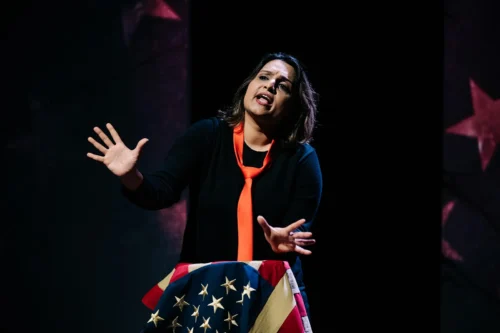
What makes #Charlottesville particularly powerful isn’t just Shetty’s remarkable performance, it’s the innovative structure. The play is based on over 100 interviews with residents, activists, students, and politicians, as well as transcripts, news reports, and political speeches. From this tapestry of voices, Shetty crafts a riveting one-woman show in which she embodies more than a dozen distinct characters, each with their own cadence, emotional rhythms, and perspective on the tragedy. With minimal costume changes or props, she deftly transforms from a terrified college student caught in the chaos to a disillusioned activist grappling with post-rally trauma, from a concerned mother to a calculating political figure. The result is a nuanced and multifaceted narrative that exposes not only the horror of the violence but also the lasting scars it left behind.
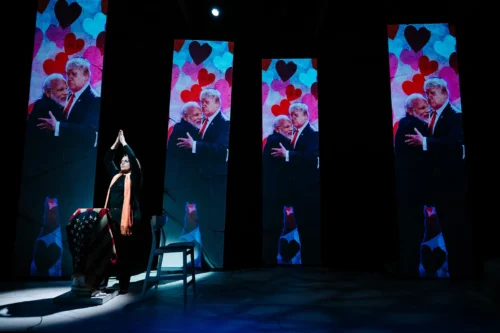
Visually, the production employs a sparse yet effective design. Matthew J. Keenan‘s stage is largely bare, with Dylan Uremovitch‘s projections of archival footage, news headlines, and abstract visuals providing historical context and emotional weight. The use of multimedia is both strategic and restrained—it never overwhelms the live performance but instead amplifies its emotional resonance. Uremovitch’s subtle lighting cues and Tony Angelini & Dan Martin‘s well-placed sound effects mark Shetty’s seamless transitions between characters, making it easy for the audience to follow the shifting perspectives without confusion.
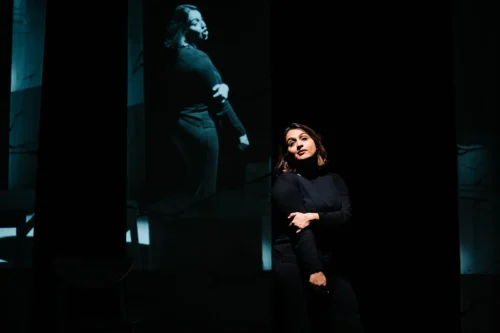
Thematically, #Charlottesville is as much about the rally itself as it is about the ripple effects that continue to shape public discourse. The play doesn’t shy away from depicting the insidious forces of white supremacy, nor does it offer easy answers. Instead, it presents a raw and unflinching meditation on the fragility of civic unity and the dangers of collective complacency in the face of hate.
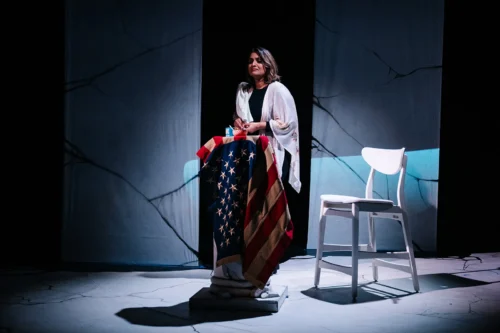
#Charlottesville at the Keegan Theatre, directed by Yury Urnov, is more than a theatrical production—it is an emotional reckoning. It reminds audiences that while the rally itself may be part of the historical record, its reverberations continue to be felt in contemporary America. Shetty’s haunting and compassionate portrayal ensures that the voices of those impacted by the events in Charlottesville are not forgotten. It is a bold, affecting, and deeply necessary piece of theater that demands to be seen.
photos by Cameron Whitman
#Charlottesville
Keegan Theatre, 1742 Church Street NW in DC
in co-production with Voices Festival Productions
70 minutes (no intermission)
ends on April 13, 2025
for tickets, visit Keegan
then plays Edinburgh Fringe Festival, August 2025
for more shows, visit Theatre in DC
# # # # # # # # # # # # # # #
The talk back offered after the matinee performance was extremely interesting and illuminating where the actor/playwright shared her process:
“You know, when I first began the interview process in 2018—just a year after the rally—I sensed that the community still needed time to heal. The wounds were fresh, and I was also processing some of the personal experiences you heard about in the play. Initially, I actually intended to write #Charlottesville first, but instead, I ended up creating The Elephant in the Room. That piece dives more deeply into my own experiences, and at the time, I felt I needed to express those feelings artistically before I could take on something as complex and collective as #Charlottesville.
“As more time passed, I kept waiting for someone else to write this play. I genuinely believed that it needed to come from someone within the community—someone American, not an immigrant like myself. I struggled with the feeling that I didn’t have the right to tell this story. How could I, as an outsider, give voice to such a profoundly local and national tragedy?
“But then something shifted. Moisés Kaufman from Tectonic Theater Project visited and spoke about the process of creating The Laramie Project. He described how their ensemble traveled to Laramie, Wyoming, conducted interviews with members of the community, and crafted a verbatim theater piece from those voices. That was a lightbulb moment for me. I realized that if #Charlottesville could be built from the authentic voices of the people who lived through it, then I could serve as the medium. I didn’t have to speak for the community—I could let them speak through me.
“At the beginning of the writing process, the play was purely based on community stories. It was a deeply personal and localized collection of testimonies. The political backdrop—the alt-right figures and ideology you see in the play today—wasn’t part of the initial draft. But as I continued to develop the piece, I realized it was essential to include those elements to provide a fuller, more honest picture of what happened. It became clear that while the play is rooted in individual experiences, it also needed to confront the larger systems and forces at play.
“Ultimately, what started as a project I didn’t feel entitled to write became a powerful lesson in the universality of bearing witness. It showed me that sometimes, an outside perspective can offer a necessary distance—one that helps amplify the voices of those most affected. And in sharing this piece, my hope is that the community’s words continue to resonate and remind us all of the importance of collective remembrance and accountability.”
